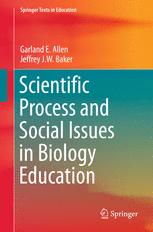

Most ebook files are in PDF format, so you can easily read them using various software such as Foxit Reader or directly on the Google Chrome browser.
Some ebook files are released by publishers in other formats such as .awz, .mobi, .epub, .fb2, etc. You may need to install specific software to read these formats on mobile/PC, such as Calibre.
Please read the tutorial at this link: https://ebookbell.com/faq
We offer FREE conversion to the popular formats you request; however, this may take some time. Therefore, right after payment, please email us, and we will try to provide the service as quickly as possible.
For some exceptional file formats or broken links (if any), please refrain from opening any disputes. Instead, email us first, and we will try to assist within a maximum of 6 hours.
EbookBell Team

4.4
32 reviewsThis book complements fact-drive textbooks in introductory biology courses, or courses in biology and society, by focusing on several important points: (1) Biology as a process of doing science, emphasizing how we know what we know. (2) It stresses the role of science as a social as well as intellectual process, one that is always embedded in its time and place in history.
In dealing with the issue of science as a process, the book introduces students to the elements of inductive and deductive logic, hypothesis formulation and testing, the design of experiments and the interpretation of data. An appendix presents the basics of statistical analysis for students with no background in statistical reasoning and manipulation. Reasoning processes are always illustrated with specific examples from both the past (eighteenth and nineteenth century) as well as the present.
In dealing with science and social issues, this book introduces students to historical, sociological and philosophical issues such as Thomas Kiuhn’s concept of paradigms and paradigm shifts, the social-constructions view of the history of science, as well as political and ethical issues such human experimentation, the eugenics movement and compulsory sterilization, and religious arguments against stem cell research and the teaching of evolution in schools.
In addition to specific examples illustrating one point or another about the process of biology or social-political context, a number of in-depth case studies are used to show how scientific investigations are originated, designed, carried out in particular social/cultural contexts. Among those included are: Migration of monarch butterflies, John Snow’s investigations on the cause of cholera, Louis Pasteur’s controversy over spontaneous generation, the mass extinction of the dinosaurs, and the Tuskegee syphilis experiment.